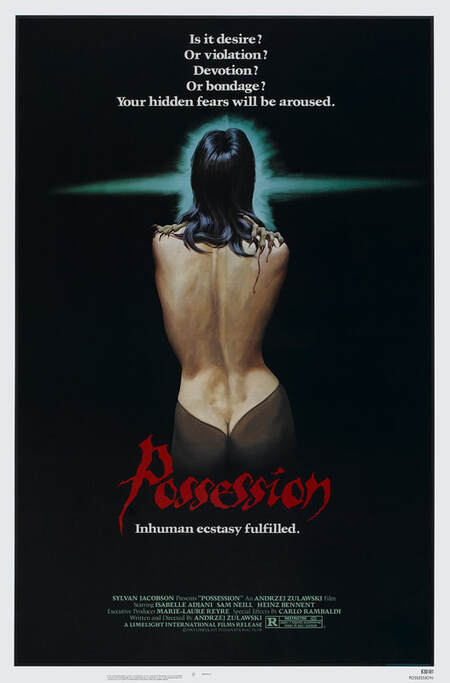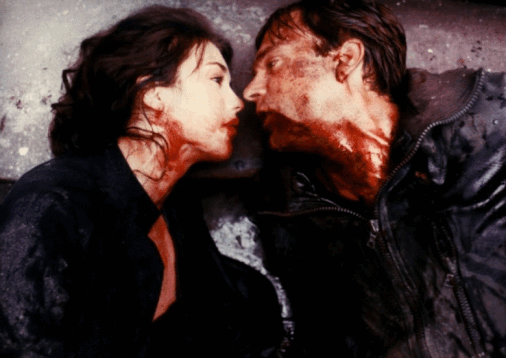|
Michael Seymour Blake talks movies Andrzej Żuławski had completed around three-quarters of On the Silver Globe before the Polish Ministry of Culture shut the film down in 1978. Their public reasoning: mounting financial concerns. Żuławski suspected it was a politically motivated move (his work being too antimarxist, anticommunist). Either way, the ministry made life difficult for him, banning him from future projects. Unable to easily leave the country, he found himself walking the grey Warsaw streets feeling “miserable, gloomy, and resentful.” A spiritual nomad. The idea for Possession was conceived during these somber wanderings. He wanted to create something that defied borders and political systems. Something that could not be controlled or commanded. Żuławski’s French buddy, who worked in Hollywood at the time, helped him get to America (the very same buddy ended up marrying Żuławski’s ex-wife). It was there in Manhattan, NY, still dealing with lingering marital issues and feeling oppressed by communist Poland, that Possession evolved from idea to screenplay—and rapidly too, a sudden pouring forth in just a few months. The film reached its final birthing stage in Berlin, in large part thanks to American financial backing. The Berlin wall felt like the perfect place to shoot a movie about separation and identity. With such a multilayered inception, how could this movie be anything other than what it is? Plus, let’s not forget the fact that Żuławski was born in Soviet Ukraine in 1940— basically thrown right into the apocalypse of WWII. Possession is notoriously difficult to define, and there are seemingly infinite ways to analyze all the film throws at us. Reviewing something like this is challenging because entire thesis papers can be written about almost every element and theme involved. OK, MSB, we get it! What’s it about already? The short version is that it centers around the separation of a husband and wife. A man named Mark (Sam Neill), who is some kind of spy/intelligence agent, returns home from a job to discover his wife, Anna (Isabelle Adjani), wants a divorce. She’s acting erratic, and it all feels so sudden. Their son, Bob (played by Michael Hogben), stays with Anna after the separation, but is neglected. Soon Mark confronts a guy named Heinrich (Heinz Bennent), the “enlightened” thinker and lover Anna’s been having an affair with. After a violent confrontation with the adulterer (Mark instigates, then gets knocked around by the physically superior man), Mark finds out there’s yet another mysterious reason for Anna’s recent behavior. He hires a PI who follows her to a ramshackle apartment building. It’s in that busted up place that the PI stumbles upon the horrific truth. Meanwhile, Mark meets Helen, a schoolteacher that looks exactly like Anna. What the hell is going on? This is a movie of doppelgangers, improperly used electric knives, dead dogs (gods?), crises of faith, and a skeleton in the closet to end all skeletons in the closets. Possession feels like a frenzied improvisational dance. Bruno Nuytten’s cinematography compliments the frenetic spirit of the movie. The camera coils across scenes, pushes us into awkward close-ups, and shakily follows people into madness. A more docile perspective would have enervated the final product. The frantic editing and sudden bursts of music by Andrzej Korzynski also keep us from ever relaxing in our seats. Mirroring/reflections play a major role in Possession. We see them often. Early on, a distraught Mark moans into a phone, unable to speak, and later, a distraught Anna moans at a crucified Christ, unable to speak. When Mark sits down at the PI office, the agent vaguely mimics Mark’s chair-swiveling. The camera relaxes here, letting us observe this echo. Anna’s broken-legged friend Margit (played by Margit Carstensen) acts as a poor reflection of Anna (I call her “bootleg Anna”). We then briefly meet a woman wearing one black boot who seems to reflect Margit. “We are all the same,” a knife-wielding Anna tells Heinrich at one point in the film, “but in different words. In different bodies, and different versions.” One of the two most obvious examples of mirroring (without spoiling too much) is the character of Helen. She is Anna’s incongruous twin (played by Adjani with green contacts and different hair). Helen possesses a more pleasant, domestic personality. In a movie overrun with symbolism and cosmic horror mayhem, you start to wonder if Helen is actually human, or just the ideal counterpoint to Anna’s dark secret, a walking reflection. Like Anna says, “Goodness is only some kind of reflection upon evil.” Demoniac performances imbue Possession with a mythic energy. Adjani gets most of the love, but Neill and Bennent more than hold their own. Neill plays a man fractured, his faith in family—a stand-in for his abandoned faith in God?—pulled apart like taffy. We watch him spiral into sweat-soaked withdrawals, then calmly manipulate with a devious grin. Bennent’s spiritual gestures and overt mysticism are both hilarious and off-putting, especially after we see his character for what he truly is. The famous subway scene where Anna is torn apart by the “two sisters” battling within her is one of the greatest experiences I’ve had with cinema. She flings herself around, shrieking, crying, convulsing. We follow her through it all, a handheld camera making it feel like we’re witnessing the gyrating display in person. It’s the most violent ballet ever filmed, culminating in an equally violent, otherworldly miscarriage. Fitting that the scene was shot towards the end of production, a perfect encapsulation of this laborious movie. From its intriguing opening to its apocalyptic final act, Possession is fraught with anxiety and impending doom. It’s open-ended enough for multiple interpretations, but isn’t so vague that it feels cheap. Love it or hate it, you’ll be emotionally regrouping once the credits roll.
Comments are closed.
|
AuthorOur fabulous blog team Archives
June 2024
CategoriesAll 12 Songs Art Art And Athletes Book Review Chorus Blog Date This Book Game Of Narratives Guest Blog Letter From The Editor Lifehacks Movies Of 2019 Music Pup Sounds Smackdown Strive For 55 Summer Playlists |





 RSS Feed
RSS Feed